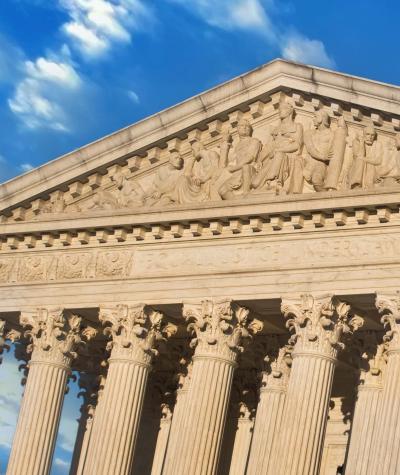The U.S. Supreme Court is hearing a case this term that has the potential to further erode voter protections and hurt voters across the country.
In Louisiana v. Callais, the Supreme Court is being asked to reconsider whether Section 2 of the Voting Rights Act (VRA) can be used to ensure all voters can vote under fair maps and make their voices heard.
In this case challenging Louisiana’s congressional map, the question is whether the state’s intentional creation of a second Black-majority district to comply with the VRA is a violation of the U.S. Constitution.
But following a law that prevents racial discrimination is not an act of racial discrimination. The Louisiana map does not violate the U.S. Constitution — and Campaign Legal Center has filed two amicus briefs emphatically outlining this.
So, how did we get here?
Passed in 1965, the Voting Rights Act (VRA) prohibits racial discrimination in voting.
Since its passage, the VRA has been critical in the fight to ensure that no American is denied access to the ballot box because of their race. The Supreme Court’s 2023 decision in Allen v. Milligan reaffirmed the VRA’s role in preventing racial discrimination.
Section 2 of the VRA requires that when certain conditions are met, an opportunity district must be drawn. An opportunity district is one where voters who are part of a race or language minority group in a particular area have a meaningful opportunity to elect candidates of their choice.
Following the 2020 census, population changes and other current electoral conditions showed that Louisiana needed to create two opportunity districts in the state’s congressional map to ensure that Black voters could elect a candidate of their choice. But Louisiana only drew one.
Black voters challenged this map under Section 2 of the VRA, and the map was struck down in federal court. The court ruled that the map weakened the voting power of Black Louisianans in violation of the VRA, which required that two opportunity districts be created to ensure fair representation for Black voters.
Following the court’s order, the state implemented a new map that followed the requirements of the VRA and created two opportunity districts where Black voters had the opportunity to elect candidates of their choice, in addition to pursuing other political goals.
As a result, two Black Louisianans were elected to Congress for the first time in history.
However, following this historic election, a group of self-described “non-Black” voters filed a new lawsuit alleging that the new VRA-compliant map is an illegal racial gerrymander.
Here’s the problem with their argument: The second Black-majority district was created to comply with the VRA to ensure that all voters could participate meaningfully in the democratic process. It is compliance with a federal law, not a constitutional violation.
What’s next?
During its most recent term, the Supreme Court considered this meritless challenge to the new map by non-Black voters, and Campaign Legal Center filed a legal brief in this case on behalf of our clients in North Dakota, the Mandan, Hidatsa and Arikara (MHA) Nation and individual voters, who face a similar battle for equal representation.
The brief reminded the high court that states must be allowed to consider the VRA when drawing maps.
Rather than issue a decision, the Supreme Court set the case for reargument in the October 2025 term. The high court then asked for additional briefs on the question of whether Louisiana’s creation of a second Black-majority district violates the 14th or 15th Amendments to the U.S. Constitution.
Campaign Legal Center filed another legal brief in support of the group of Black Louisianans who originally sued, arguing that Section 2 of the VRA remains a critical protection to defend against racial discrimination when drawing maps.
The brief explains how current voting conditions still require the safeguards of the Voting Rights Act, and why there is no time limit on the power to enforce the protections of the 14th and 15th Amendments to the Constitution.
We’re urging the Supreme Court to uphold the protections outlined in the Voting Rights Act to ensure that all voters can make their voices heard and continue to use Section 2 as a critical tool to preserve states’ abilities to remedy unfair maps under the VRA.
Your support helps make sure Campaign Legal Center can continue fighting on behalf of American voters so every voice is heard and every vote counts equally.


